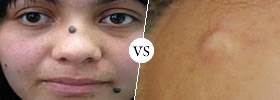Difference between Bipolar and Depression
Key Difference: Bipolar disorder is a condition in which people experience extensive mood swings. A person may start of being happy and then go quickly to becoming sad or depressed. Depression is defined as a state of low mood and aversion to activity. This is usually caused by a biochemical imbalance in brain, which hamper the nerve cells’ ability to communicate with each other.
Bipolar and depression are two types of medical conditions that have many similar symptoms. These symptoms often confuse people into diagnosing a person with the wrong condition. Both bipolar and depression include symptoms such as exhibiting sadness, suicidal tendencies, sleeplessness, forgetfulness, distracted behavior, etc. Though, they have similar symptoms, they are actually two different medical conditions. A trained medical practitioner often diagnoses a person based on tests, constant monitoring and a series of careful questions.
 Bipolar disorder is a condition in which people experience extensive mood swings. A person may start of being happy and then go quickly to becoming sad or depressed. These mood swings are very fast and can happen in a couple of minutes. Bipolar disorder is equally common in men and women between the ages of 15-25 and there is no exact reason for the cause of this disorder, though it has been attributed to life changing situations, medications, lack of sleep and recreational drug use.
Bipolar disorder is a condition in which people experience extensive mood swings. A person may start of being happy and then go quickly to becoming sad or depressed. These mood swings are very fast and can happen in a couple of minutes. Bipolar disorder is equally common in men and women between the ages of 15-25 and there is no exact reason for the cause of this disorder, though it has been attributed to life changing situations, medications, lack of sleep and recreational drug use.
There are three types of bipolar disorder: Bipolar Disorder type I, Bipolar Disorder type II and cyclothymia. Bipolar type I is a disorder where people at least one manic episode and periods of major depression. This type of disorder was previously known as maniac depression. Type II have never suffered a full mania, however they experience high energy levels and impulsiveness, causing to be happy and really excited (known as hypomania) at one time and sad and depressed a little while later. Cyclothymia is a mild form of bipolar disorder in which a person only experiences small mood swings which are not that dangerous. People with this form alternate between hypomania and mild depression.
The symptoms for bipolar disorder may last from minutes to days to months and include easy distraction, feeling of sleeplessness, poor judgment, loss of temper, reckless behavior or lack of self control (drug use, dangerous behavior, reckless driving, etc), very elevated mood (hyperactive nature, increased energy, etc), very involved in activities, easily upset or agitated, loss of appetite, fatigue or lack of energy, difficulty concentrating, loss of pleasure in activities, low self-esteem, suicidal thoughts, etc. These symptoms take more prominence in bipolar disorder type I and are present with a lesser intensity in the type II. CBT, parental anxiety management, hypnotherapy treatments, herbal treatments, caffeine elimination and combined treatments are few treatments that have been proving effective in treating bipolar disorders.

Depression is defined as a state of low mood and aversion to activity. This is usually caused by a biochemical imbalance in brain, which hamper the nerve cells’ ability to communicate with each other. These cells communicate using chemicals called neurotransmitters, some of which help maintain moods. If there is a deficiency in these chemicals, the person can experience depression. There are various different types of depression, which can range from minor to major including Clinical depression, chronic depression, Atypical Depression, Bipolar Depression (Manic Depression), Seasonal Depression (SAD) and Psychotic Depression.
Usually, a person would feel down or blue for a time being while the brain corrects the imbalance. However, if the imbalance continues, the depression could get worse. One might even need to take medication to correct the imbalance. Symptoms of depression include low energy, a loss of interest in normal activities, change in appetite, weight gain or weight loss, excessive sleep, insomnia, and the loss of ability to concentrate. Continued stress can also bring on depression. Depression can have some severe consequences, such as an impact on personal relationships, job performance, and can cause physical deterioration through lack of care. A person with depression will usually feel extremely lonely, pessimistic and might even think about committing suicide.
|
|
Bipolar |
Depression |
|
Definition |
Bipolar is a psychotic disorder during which the patient exhibits excessive mood swings such as mania and depression. |
Depression is a condition that causes people to be in a state of low mood. This state affects the person’s daily activities. |
|
Symptoms |
Symptoms differ depending on the person. However, constant and excessive mood swings are associated with bipolar. |
Low energy, a loss of interest in normal activities, change in appetite, weight gain or weight loss, excessive sleep, insomnia, and the loss of ability to concentrate. |
|
Causes |
Bipolar disorder has been attributed to genetics, physiological and environmental factors. |
Depression is caused by a number of factors in a person’s life. Some known causes include abuse, certain medications, conflict, death or a loss, genetics, major changes, personal problems, serious illnesses and substance abuse. |
|
Types |
Bipolar I disorder, Bipolar II disorder, Cyclothymia and Bipolar disorder NOS. |
Clinical depression, chronic depression, Atypical Depression, Bipolar Depression (Manic Depression), Seasonal Depression (SAD) and Psychotic Depression. |
|
Treatment |
CBT, parental anxiety management, hypnotherapy treatments, herbal treatments, caffeine elimination and combined treatments. |
Depending on the worseness of the depression, it can be treated through medicines, therapy and various other measures. |
Image Courtesy: wingoodtherapy.com, npr.org









Add new comment